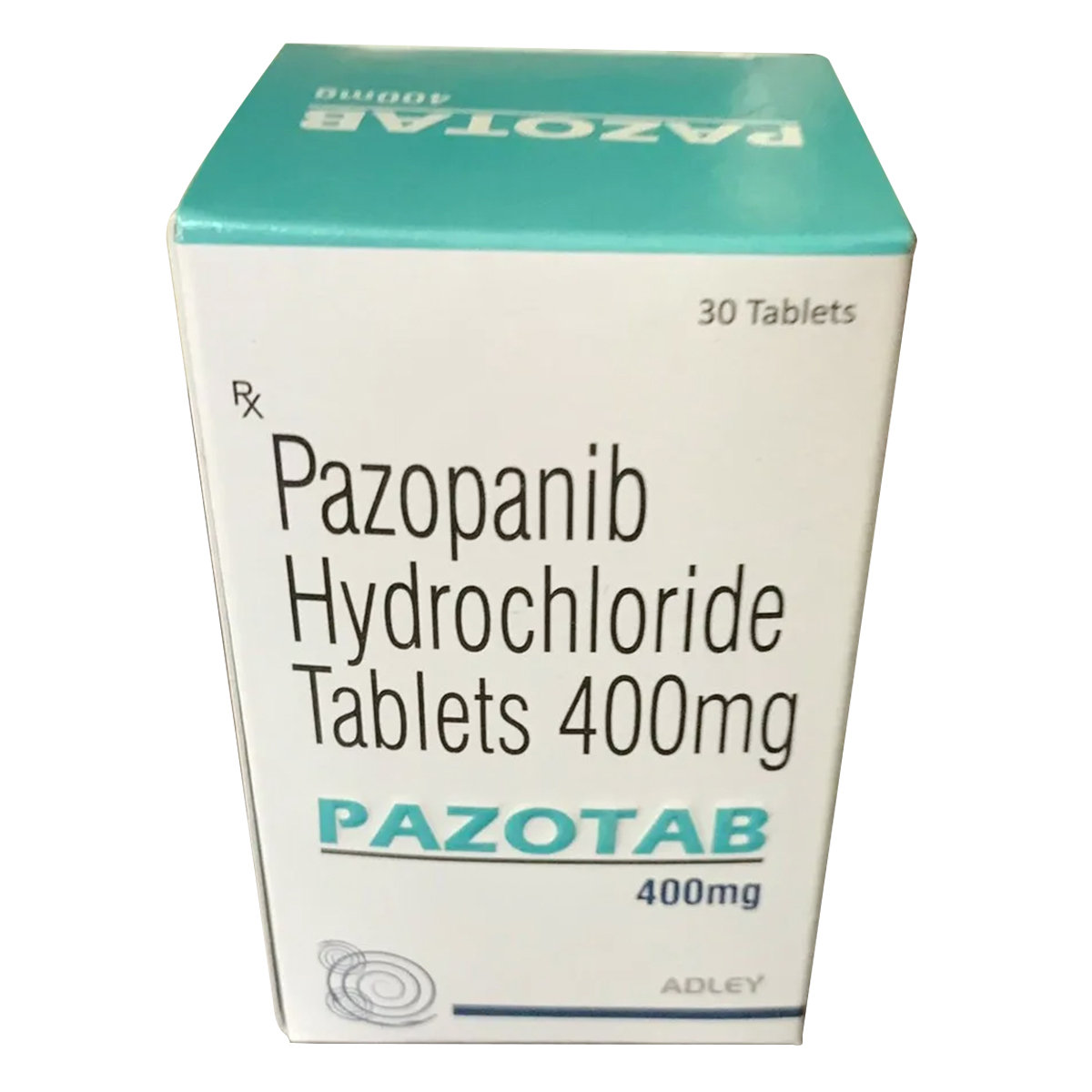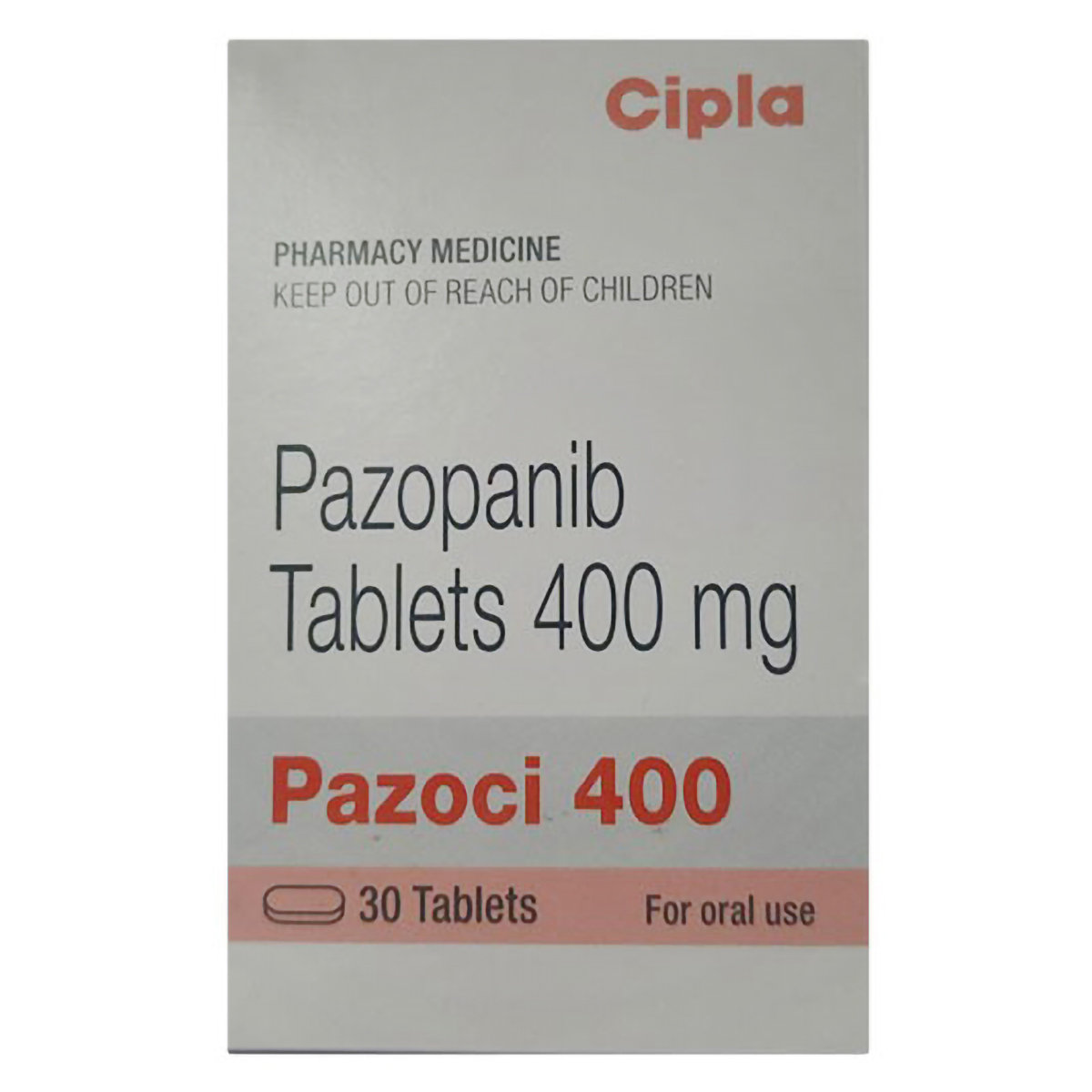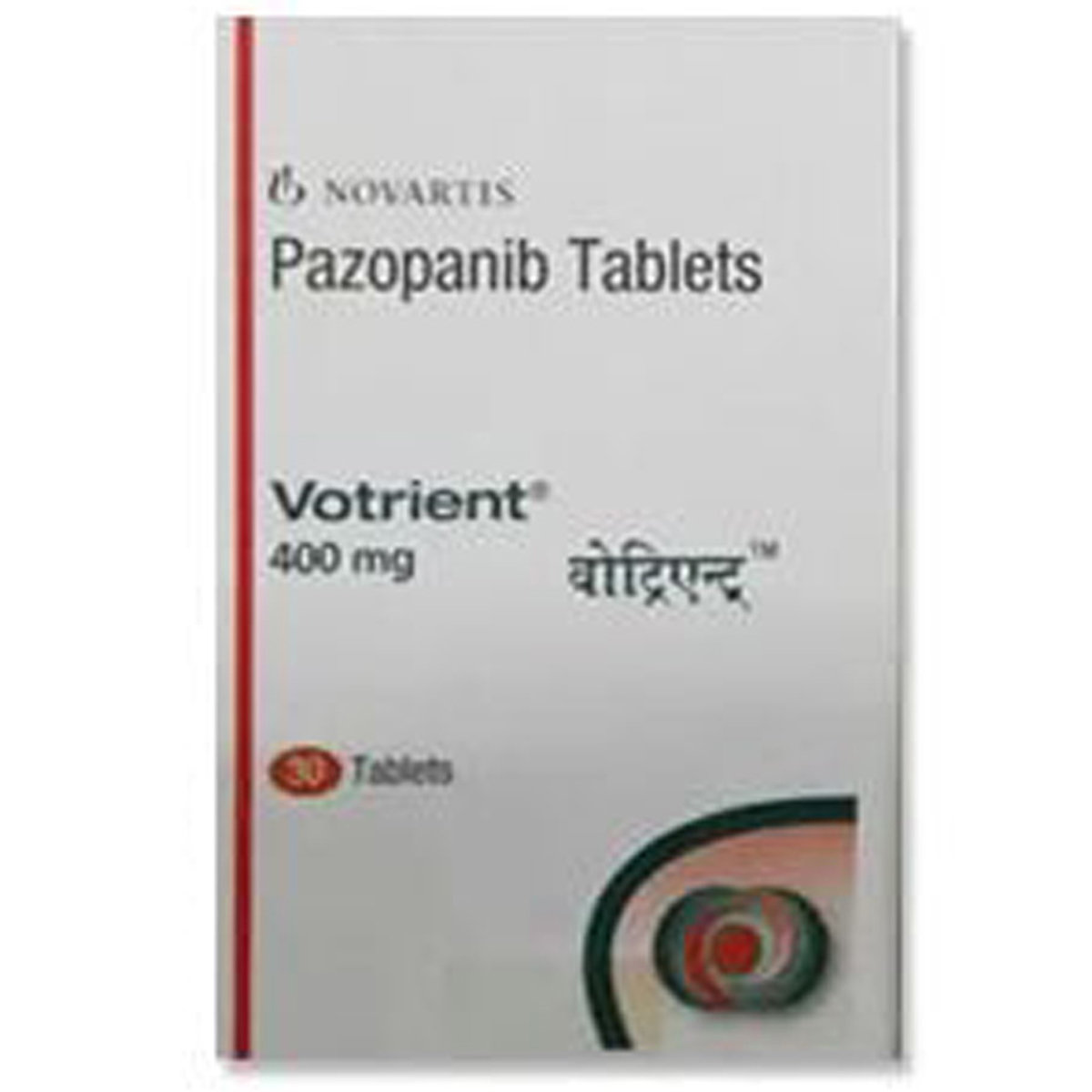Zupanib-400 Tablet 30's
MRP ₹17370
(Inclusive of all Taxes)
₹2605.5 Cashback (15%)
Provide Delivery Location
Online payment accepted
 Prescription drug
Prescription drugWhats That
Composition :
Manufacturer/Marketer :
Consume Type :
Return Policy :
About Zupanib-400 Tablet 30's
Zupanib-400 Tablet 30's belongs to the group of medicine called ‘anti-cancer’ that is primarily indicated in the treatment of kidney and soft tissue cancer. Kidney cancer also known as renal cancer is a disease in which healthy cells of the kidney become malignant (cancerous), grow in an uncontrolled manner and forms a tumor. When a group of cancer occurs in different parts of the body such as bones, muscles, deep layers of skin, and fat then it is known as soft tissue sarcomas. This type of cancer may also form in nerves, blood vessels or connective tissues that support organs of the body.
Zupanib-400 Tablet 30's contains 'Pazopanib' which falls in the category of medicines known as 'kinase inhibitors'. It works by stopping the action of an abnormal protein that causes the multiplication of cancerous cells. In this way, it stops the spread of cancerous cells.
Take Zupanib-400 Tablet 30's as prescribed by your doctor. You are suggested to take Zupanib-400 Tablet 30's as long as your doctor has prescribed it after checking your medical condition. In some cases, you may experience certain common side effects such as itching or skin rash, acne, dry skin, vomiting, diarrhea and loss of appetite. Most of these side effects do not require medical attention and will resolve gradually over time. However, you are advised to talk to your doctor if you experience these side effects persistently.
To treat your condition effectually, continue taking Zupanib-400 Tablet 30's for as long as your doctor has prescribed. Do not take Zupanib-400 Tablet 30's if you are pregnant or planning for pregnancy as Zupanib-400 Tablet 30's causes serious birth defects. Zupanib-400 Tablet 30's should not be taken by breastfeeding mothers as it passes into breast milk and may cause possible risk to the infant. Elderly people are more sensitive to medicine so the doctor may adjust the dosage according to the condition. Avoid consuming alcohol along with Zupanib-400 Tablet 30's as it could lead to increased dizziness.
Uses of Zupanib-400 Tablet 30's
Directions for Use
Key Benefits
Zupanib-400 Tablet 30's is a ' tyrosine kinase inhibitor (TKI)', that stops the uncontrolled growth and spread of cancerous cells. Zupanib-400 Tablet 30's is effective in treating thyroid, liver and kidney cancer. It acts by stopping the action of the abnormal protein that is responsible for the multiplication of cancerous cells. Whenever a new healthy cell is formed it undergoes a usual process of maturity. Cancerous cells form new cells more quickly so Zupanib-400 Tablet 30's targets cancerous cells and blocks the action of Tyrosine kinases enzymes (responsible for causing cancer). It also decreases the blood supply to cancer tumors to slow down the growth of the tumor. In this way, Zupanib-400 Tablet 30's stops the production, spread and growth of cancerous cells in the body.
Storage
- Inform Your Doctor: Notify your doctor immediately about your diarrhoea symptoms. This allows them to adjust your medication or provide guidance on managing side effects.
- Stay Hydrated: Drink plenty of fluids to replace lost water and electrolytes. Choose water, clear broth, and electrolyte-rich drinks. Avoid carbonated or caffeinated beverages to effectively rehydrate your body.
- Follow a Bland Diet: Eat easy-to-digest foods to help firm up your stool and settle your stomach. Try incorporating bananas, rice, applesauce, toast, plain crackers, and boiled vegetables into your diet.
- Avoid Trigger Foods: Steer clear of foods that can worsen diarrhoea, such as spicy, fatty, or greasy foods, high-fibre foods, and dairy products (especially if you're lactose intolerant).
- Practice Good Hygiene: Maintain good hygiene to prevent the spread of infection. To stay healthy, wash your hands frequently, clean and disinfect surfaces regularly, and avoid exchanging personal belongings with others.
- Take Anti-Diarrheal Medications: If your doctor advises, anti-diarrheal medications such as loperamide might help manage diarrhoea symptoms. Always follow your doctor's directions.
- Keep track of your diarrhoea symptoms. If they don't get better or worse or are accompanied by severe stomach pain, blood, or dehydration signs (like extreme thirst or dark urine), seek medical help.
- Consult your doctor for dose adjustment or alternative medicine if you notice hair color changes.
- To avoid further scalp irritation, use a mild shampoo and conditioner.
- Avoid harsh styling techniques such as tight hairstyles and excessive heat styling.
- Discuss your concerns with a professional hairstylist who can recommend color techniques to manage the look of hair color changes.
- Inform your doctor about the nausea and discuss possible alternatives to the medication or adjustments to the dosage.
- Divide your daily food intake into smaller, more frequent meals to reduce nausea.
- Opt for bland, easily digestible foods like crackers, toast, plain rice, bananas, and applesauce.
- Avoid certain foods that can trigger nausea, such as fatty, greasy, spicy, and smelly foods.
- Drink plenty of fluids, such as water, clear broth, or electrolyte-rich beverages like coconut water or sports drinks.
- Use ginger (tea, ale, or candies) to help relieve nausea.
- Get adequate rest and also avoid strenuous activities that can worsen nausea.
- Talk to your doctor about taking anti-nausea medication if your nausea is severe.
- Record when your nausea occurs, what triggers it, and what provides relief to help you identify patterns and manage your symptoms more effectively.
- Rest well; get enough sleep.
- Eat a balanced diet and drink enough water.
- Manage stress with yoga and meditation.
- Limit alcohol and caffeine.
- Physical activities like walking or jogging might help boost energy and make you feel less tired.
- Preventing Vomiting (Before it Happens)
- Take medication exactly as prescribed by your doctor. This can help minimize side effects, including vomiting.
- Having a small meal before taking your medication can help reduce nausea and vomiting.
- Talk to your doctor about taking anti-nausea medication along with your prescribed medication.
- Managing Vomiting (If it Happens)
- Try taking ginger in the form of tea, ale, or candy to help alleviate nausea and vomiting.
- What to Do if Vomiting Persists
- Consult your doctor if vomiting continues or worsens, consult the doctor for guidance on adjusting your medication or additional treatment.
- Drink water or other clear fluids.
- To prevent worsening of pain, limit intake of tea, coffee, or alcohol.
- Include bland foods like rice, toast, crackers, and rice in your diet.
- Avoid lying down immediately after eating as it may cause indigestion or heartburn.
- Avoid acidic and spicy food as it may cause indigestion.
Drug Warnings
Zupanib-400 Tablet 30's may make you more susceptible to infections; consult your doctor if you develop any signs of infections such as fever, sore throat, breathlessness, jaundice, unexplained bleeding or bruising. Your doctor may advise you to undergo regular blood tests, kidney and liver tests to monitor your condition. Inform your doctor about your health condition and medicines to rule out any unpleasant side-effects. Before your doctor prescribes you Zupanib-400 Tablet 30's, tell them if you have heart problems, high blood pressure, bleeding issues, surgery or an electrolyte imbalance (like abnormal levels of magnesium, calcium or potassium in the blood). Zupanib-400 Tablet 30's is restricted to use in persons who are sensitive to any of its constituents or have squamous cell lung cancer or already taking carboplatin and paclitaxel.
Drug-Drug Interactions
Drug-Drug Interactions
Login/Sign Up
Taking Zupanib-400 Tablet with Grepafloxacin can increase the risk of irregular heart rhythm.
How to manage the interaction:
Taking Zupanib-400 Tablet with Grepafloxacin is not recommended, but can be taken together if prescribed by a doctor. However, if you experience any unusual symptoms contact your doctor immediately. Do not stop using any medications without first talking to your doctor.
Using Zupanib-400 Tablet together with halofantrine can increase the risk of abnormal heart rhythm.
How to manage the interaction:
Taking Zupanib-400 Tablet with Halofantrine is not recommended, but it can be taken together if prescribed by a doctor. However, consult your doctor if you experience sudden dizziness, lightheadedness, fainting, shortness of breath. Do not discontinue any medications without consulting a doctor.
Taking Zupanib-400 Tablet with Ziprasidone can increase the risk of irregular heart rhythm.
How to manage the interaction:
Although there is an interaction between Zupanib-400 Tablet and Ziprasidone, they can be taken together if prescribed by a doctor. However, consult a doctor if you experience sudden dizziness, lightheadedness, fainting, or shortness of breath. Do not discontinue any medications without consulting a doctor.
Co-administration of Zupanib-400 Tablet with mesoridazine can increase the risk of abnormal heart rhythm.
How to manage the interaction:
Taking Mesoridazine with Zupanib-400 Tablet is not recommended, but it can be taken together if prescribed by a doctor. However, consult your doctor if you experience sudden dizziness, lightheadedness, fainting, shortness of breath. Do not discontinue any medications without consulting a doctor.
Taking dronedarone together with Zupanib-400 Tablet can increase the risk of an irregular heart rhythm
How to manage the interaction:
Taking Zupanib-400 Tablet with Dronedarone is not recommended, but it can be taken together if prescribed by a doctor. However, consult your doctor if you experience sudden dizziness, lightheadedness, fainting, shortness of breath. Do not discontinue any medications without consulting a doctor.
Taking Pimozide with Zupanib-400 Tablet can increase the risk of irregular heart rhythm.
How to manage the interaction:
Taking Zupanib-400 Tablet with Pimozide is not recommended, but it can be taken together if prescribed by a doctor. However, consult your doctor if you experience sudden dizziness, lightheadedness, fainting, shortness of breath. Do not discontinue any medications without consulting a doctor.
Coadministration of Yellow fever vaccine with Zupanib-400 Tablet can increase the risk of infection.
How to manage the interaction:
Taking Zupanib-400 Tablet with Yellow fever vaccine is not recommended, they can be taken together if prescribed by a doctor. Do not discontinue any medications without consulting a doctor.
Co-administration of Zupanib-400 Tablet with aluminium hydroxide can reduce the blood levels and effects of Zupanib-400 Tablet.
How to manage the interaction:
Although there is an interaction between Zupanib-400 Tablet and Aluminium hydroxide, they can be taken together if prescribed by a doctor. Do not discontinue any medications without consulting a doctor.
Taking BCG vaccine with Zupanib-400 Tablet can increase the risk of infection.
How to manage the interaction:
Taking Zupanib-400 Tablet with BCG vaccine is not recommended, they can be taken together if prescribed by a doctor. Do not discontinue any medications without consulting a doctor.
Using Zupanib-400 Tablet together with sparfloxacin can increase the risk of abnormal heart rhythm
How to manage the interaction:
Taking Zupanib-400 Tablet with Sparfloxacin is not recommended, but can be taken together if prescribed by a doctor. However, if you experience any unusual symptoms contact your doctor immediately. Do not stop using any medications without first talking to your doctor.
Drug-Food Interactions
Drug-Food Interactions
Login/Sign Up
Grapefruit Juice, Grapefruit
How to manage the interaction:
Coadministration of Zupanib-400 Tablet with grapefruit juice can increase the blood levels of Zupanib-400 Tablet, which may lead to an increased risk of serious side effects such as liver problems, irregular heart rhythm, bleeding, and high blood pressure. Avoid taking grapefruit juice along with Zupanib-400 Tablet, as it can lead to an interaction.
Diet & Lifestyle Advise
- Physical activity helps in strengthening muscles reduce fatigue, helps in weight loss and give strength. Gentle activities like 20-30minutes of walking or swimming would be helpful.
- Performing yoga and other relaxation techniques may also help in improving physical and mental health and may reduce your stress levels.
- Maintain a healthy weight by performing regular low-strain exercises and eating healthy food.
- Get adequate sleep as resting helps in improving your health, mental ability, and improves attention.
- De-stress yourself by meditating, reading books, taking a warm bubble bath, or listen to soothing music.
- Eat food rich in antioxidants such as berries, spinach, kidney beans, dark chocolate, etc.
- Foods containing fiber help in better digestion. These include beans, peas, lentils, whole grains, nuts, and seeds.
- Avoid smoking and alcohol consumption.
Side Effects of Zupanib-400 Tablet 30's
- Acne
- Dry skin
- Nausea
- Vomiting
- Diarrhea
- Loss of appetite
- Itching or skin rash
Habit Forming
Therapeutic Class
All Substitutes & Brand Comparisons
RX
Pazib 400 Tablet 30's
Glenmark Pharmaceuticals Ltd
₹3900.5
(₹106.61 per unit)
81% CHEAPERRX
Bdpazo 400 Tablet 30's
BDR Pharmaceuticals Internationals Pvt Ltd
₹3510
(₹117.0 per unit)
79% CHEAPERRX
Out of StockPazocam 400 mg Tablet 30's
MEDICAMEN BIOTECH LTD
₹4500
(₹123.0 per unit)
78% CHEAPER
Drug-Diseases Interactions
Drug-Diseases Interactions
Login/Sign Up
FAQs
Zupanib-400 Tablet 30's is safe to be taken by a diabetic person. However, take Zupanib-400 Tablet 30's only after asking with a doctor as they may adjust the dosing according to the condition of the patient.
Zupanib-400 Tablet 30's is restricted to use in pregnancy. A woman needs to have a negative pregnancy test before starting treatment with this medicine. It is better to use effective birth control methods to prevent pregnancy while taking this medicine or for at least 6 months after taking the last dose of Zupanib-400 Tablet 30's.
Zupanib-400 Tablet 30's should be stopped in cases where a person faces serious side effect that affects the quality of life. Otherwise, you need to keep taking Zupanib-400 Tablet 30's until your doctor asks you to stop it.
Before your doctor prescribes you Zupanib-400 Tablet 30's, tell them if you have heart problems, high blood pressure, bleeding issues, surgery or an electrolyte imbalance (like abnormal levels of magnesium, calcium, or potassium in the blood).
Zupanib-400 Tablet 30's is restricted to use in persons who are sensitive to any of its constituents or have squamous cell lung cancer or already taking carboplatin and paclitaxel.
Drug-Drug Interactions Checker List
- CARBAMAZEPINE
- PACLITAXEL
- OMEPRAZOLE
- NEOMYCIN
- SORAFENIB
- PHENYTOIN
Special Advise
- Seek medical attention immediately you have swelling in your lower legs, fast heartbeats, or trouble breathing. It may be a sign of a heart problem.
- Zupanib-400 Tablet 30's may cause bleeding so tell your doctor if you see blood in urine or stools.
Disease/Condition Glossary
Cancer: It is a genetic change in which our cells divide uncontrollably and spread into surrounding tissues. There are two types of cancer, namely benign (localized) and metastatic (spread to the whole body). There are more than 100 types of cancer, including blood cancer, lung cancer, breast cancer, etc. Cancer growth can be prevented by chemotherapy (by strong antibiotics), radiation and stem cell therapy.
Renal cancer: Kidneys help to get rid of waste by filtering blood, regulate fluid balance, and helps in making urine. Kidney cancer occurs when cancerous cells start growing uncontrollably in the kidneys.
Soft tissue sarcoma: It is a disease in which cancerous cells form in the soft tissues of the body such as a deep layer of skin, fat, muscles and bones. This type of cancer can also form in nerves, blood vessels or tissues that support organs of the body. This type of cancer is most common in the neck, arms, legs, abdomen and legs.

Have a query?
Alcohol
Safe if prescribed
You are recommended to avoid alcohol consumption with Zupanib-400 Tablet 30's as it may increase the risk of side effects such as dizziness, drowsiness or difficulty in concentrating.
Pregnancy
Consult your doctor
Zupanib-400 Tablet 30's is restricted to use in pregnancy. A woman needs to have a negative pregnancy test before starting treatment with this medicine. It is better to use effective birth control methods to prevent pregnancy while taking this medicine or for at least 6 months after taking the last dose of Zupanib-400 Tablet 30's.
Breast Feeding
Consult your doctor
Zupanib-400 Tablet 30's should not be taken by breastfeeding mothers as it passes into breast milk and may cause possible risk to the infant.
Driving
Safe if prescribed
It is not known if Zupanib-400 Tablet 30's may affect your driving ability or not.
Liver
Consult your doctor
Zupanib-400 Tablet 30's should be taken with caution in patients dealing with the liver disease. The dose may be adjusted by the doctor according to the medical condition of the patient.
Kidney
Consult your doctor
Zupanib-400 Tablet 30's is safe to take by patients dealing with kidney cancer as prescribed by their doctor. The dose may be adjusted by the doctor according to the medical condition of the patient.
Children
Safe if prescribed
Zupanib-400 Tablet 30's is not recommended for children below 18 years as the safety and effectiveness were not established.









